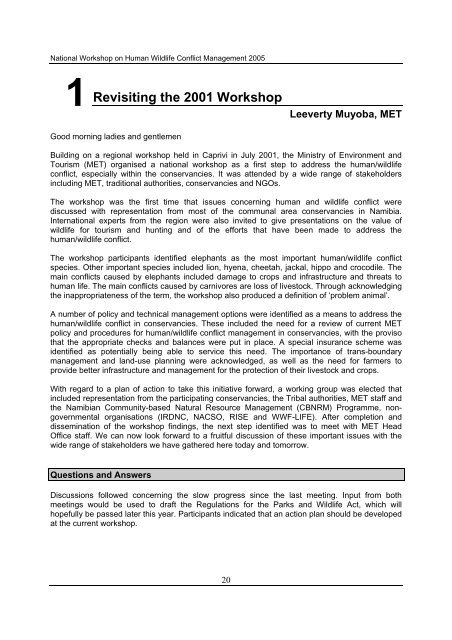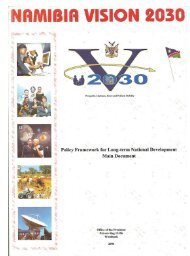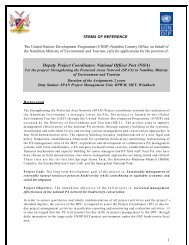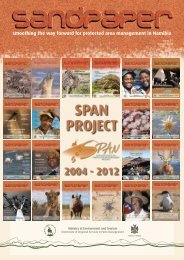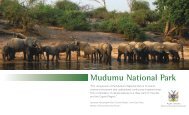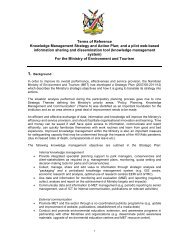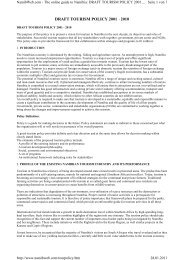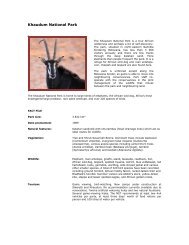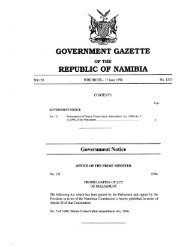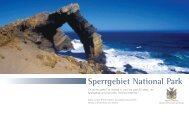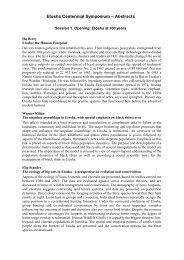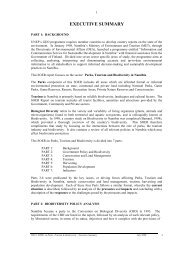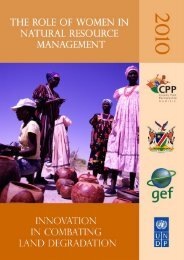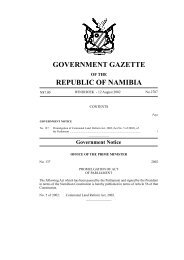HWCM - Ministry of Environment and Tourism
HWCM - Ministry of Environment and Tourism
HWCM - Ministry of Environment and Tourism
Create successful ePaper yourself
Turn your PDF publications into a flip-book with our unique Google optimized e-Paper software.
National Workshop on Human Wildlife Conflict Management 2005<br />
1<br />
Revisiting the 2001 Workshop<br />
Leeverty Muyoba, MET<br />
Good morning ladies <strong>and</strong> gentlemen<br />
Building on a regional workshop held in Caprivi in July 2001, the <strong>Ministry</strong> <strong>of</strong> <strong>Environment</strong> <strong>and</strong><br />
<strong>Tourism</strong> (MET) organised a national workshop as a first step to address the human/wildlife<br />
conflict, especially within the conservancies. It was attended by a wide range <strong>of</strong> stakeholders<br />
including MET, traditional authorities, conservancies <strong>and</strong> NGOs.<br />
The workshop was the first time that issues concerning human <strong>and</strong> wildlife conflict were<br />
discussed with representation from most <strong>of</strong> the communal area conservancies in Namibia.<br />
International experts from the region were also invited to give presentations on the value <strong>of</strong><br />
wildlife for tourism <strong>and</strong> hunting <strong>and</strong> <strong>of</strong> the efforts that have been made to address the<br />
human/wildlife conflict.<br />
The workshop participants identified elephants as the most important human/wildlife conflict<br />
species. Other important species included lion, hyena, cheetah, jackal, hippo <strong>and</strong> crocodile. The<br />
main conflicts caused by elephants included damage to crops <strong>and</strong> infrastructure <strong>and</strong> threats to<br />
human life. The main conflicts caused by carnivores are loss <strong>of</strong> livestock. Through acknowledging<br />
the inappropriateness <strong>of</strong> the term, the workshop also produced a definition <strong>of</strong> ‘problem animal’.<br />
A number <strong>of</strong> policy <strong>and</strong> technical management options were identified as a means to address the<br />
human/wildlife conflict in conservancies. These included the need for a review <strong>of</strong> current MET<br />
policy <strong>and</strong> procedures for human/wildlife conflict management in conservancies, with the proviso<br />
that the appropriate checks <strong>and</strong> balances were put in place. A special insurance scheme was<br />
identified as potentially being able to service this need. The importance <strong>of</strong> trans-boundary<br />
management <strong>and</strong> l<strong>and</strong>-use planning were acknowledged, as well as the need for farmers to<br />
provide better infrastructure <strong>and</strong> management for the protection <strong>of</strong> their livestock <strong>and</strong> crops.<br />
With regard to a plan <strong>of</strong> action to take this initiative forward, a working group was elected that<br />
included representation from the participating conservancies, the Tribal authorities, MET staff <strong>and</strong><br />
the Namibian Community-based Natural Resource Management (CBNRM) Programme, nongovernmental<br />
organisations (IRDNC, NACSO, RISE <strong>and</strong> WWF-LIFE). After completion <strong>and</strong><br />
dissemination <strong>of</strong> the workshop findings, the next step identified was to meet with MET Head<br />
Office staff. We can now look forward to a fruitful discussion <strong>of</strong> these important issues with the<br />
wide range <strong>of</strong> stakeholders we have gathered here today <strong>and</strong> tomorrow.<br />
Questions <strong>and</strong> Answers<br />
Discussions followed concerning the slow progress since the last meeting. Input from both<br />
meetings would be used to draft the Regulations for the Parks <strong>and</strong> Wildlife Act, which will<br />
hopefully be passed later this year. Participants indicated that an action plan should be developed<br />
at the current workshop.<br />
20


